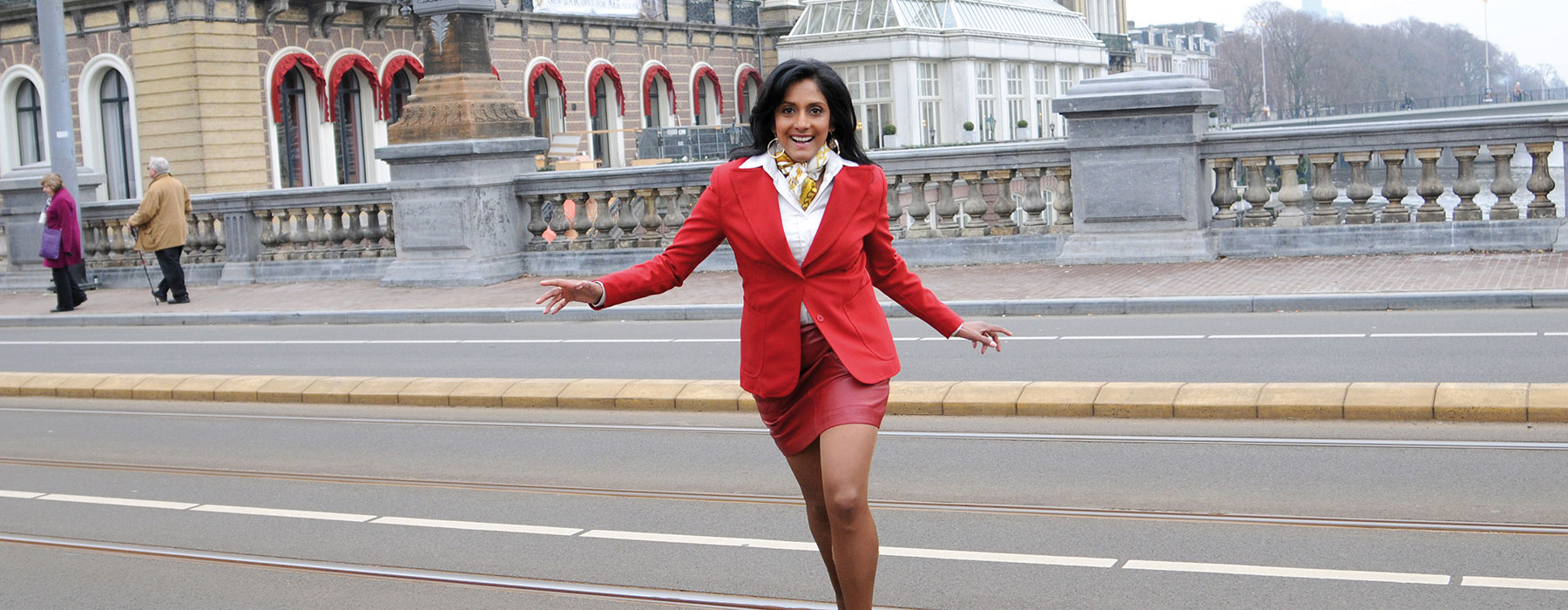NAME: NAZIMA RAMDIN
COMPANY: NR COMMUNICATIE & EVENTS
IN THE NETHERLANDS SINCE: 1969
Nazima Ramdin was introduced to the world of shows and events by her grandfather, when she was just 12 years old. She was allowed to help wherever she could with the organisation of music and dance shows by Indian Bollywood artists. After graduating she worked as a communications adviser for the Dutch government. She earned her spurs working for the Ministries of Justice, Foreign Affairs and Health, Welfare and Sport. She started her own business, NR Communicatie & Events, early in 2012. Among other things, the business helps entrepreneurs put themselves and their businesses on the map. Like her grandfather before her, she now also organises events – such as the annual, multicultural New Years Party. Nazima believes in connecting people and organisations, via collaboration and knowledge sharing, allowing people to complement and support each other. ‘Together’ is her key word: working together, eating together, celebrating together…because together you’re stronger.
1. How long have you been in The Netherlands?
I came to The Netherlands in 1969 with my mother, grandfather and grandmother.
2. How did you become an entrepreneur and why?
Entrepreneurism is something that I learnt at an early age. My grandfather, MD Ramzan, was in the garment business in Suriname. Once in The Netherlands he immediately started a shop in The Hague where he sold LPs and singles, mostly of South American and Indian (Bollywood) music, as well as tropical food products from South America and Suriname. Later he went on to become an organiser of events. He was a real pioneer and, as an entrepreneur, a great example for the Hindustani community. My grandfather is now 85 and uses his experience and lessons from life to support and advise his children and grandchildren. I was the first grandchild that graduated and he was proud, but also moved, to hear during my graduation speech that he was the one who motivated me most to persevere. While studying I gained experience as a communication adviser at various ministries.
Next to working on interesting projects for the Ministry of Welfare, Health and Sport I enjoy being an entrepreneur to the full.
I help businesses and organisations to profile themselves and the business they are in. In addition I conduct workshops and provide training in the fields of corporate and personal branding & social media.
3. Did you encounter problems when you wanted to become an entrepreneur?
Thanks to my grandfather I understood what entrepreneurship involved from an early age, so I didn’t really experience any problems. I have never felt discriminated against, though I did subconsciously feel that I had to try that little bit harder to prove myself. But that was the challenge for me: to exploit the advantage of being different.
4. What are the differences between doing business in The Netherlands and in Suriname?
The Dutch start by going to the chamber of commerce to get information, find out what subsidies are available and then start their business. From a young age Hindustanis have had to learn to survive with few resources. In so doing they have learned to hold their own as entrepreneurs.
I do find that there is a big difference when it comes to hospitality. Dutch colleagues and friends have often been surprised by my hospitality: there’s always something delicious to eat in my home. We often prepare food in large quantities, so we’re always prepared for an unexpected guest. In my family it’s normal to help each other. In The Netherlands it’s very different. I have noticed that people can’t always rely on the support of their family.
5. What is typically Dutch when it comes to doing business and being an entrepreneur?
The Dutch separate their private and business lives to a greater extent than we. Hindustanis ask for advice on both private and business issues, mostly within the family. We celebrate everything with lots of food, music and dance and it’s very common to include business contacts as well as family, friends, colleagues and acquaintances.
6. What have you taken from both the Surinamese-Hindustani and Dutch cultures?
We interweave cultures and create positive situations and long-lasting emotions when we eat together, taste each other’s cuisines, make music together and dance with each other. The Dutch generally go along with this quite easily – and enjoy it.
7. Would you ever go back to Suriname?
I would like to go back to Suriname now and then to share my knowledge and to inspire people to become entrepreneurs. One way or another I would also like to work for underprivileged children in Suriname: children are the future.
8. What are the secrets of your success?
To be genuine and have faith in yourself – if you keep that in mind you will achieve your objectives. I make contacts easily and I’m good at forming links between people and organisations. I believe in knowledge sharing and collaboration, whereby people can complement and support each other.
Not being begrudged success is also very important.
9. What is your favourite fruit, and why?
Mangos. They taste delicious and are a bit of nostalgia from my youth – they grew in my grandfather’s garden in Suriname.
10. What is your favourite Dutch product and/or place?
I love strawberries, white asparagus and poffertjes. My favourite place is Limburg, because of the space and quiet. But I also like going to the beach at Scheveningen.
TIPS from Nazima
1. Do everything with passion and with pleasure
2. Believe in your own strength and believe in what you do
3. Be yourself, be genuine – but also be flexible, go with the flow
4. Understand your target group, look and listen well
5. Live from your heart and soul
